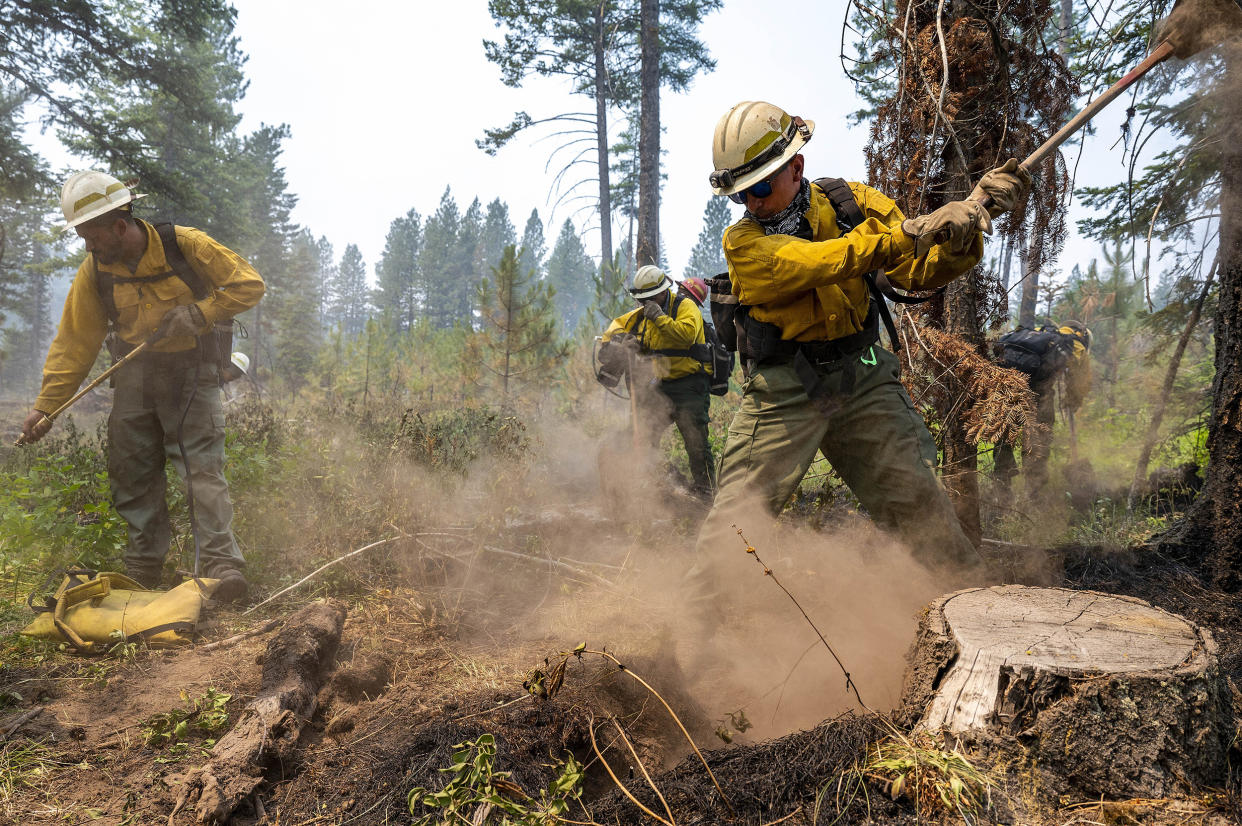Struggling federal firefighters could see pay increase in new energy package
As wildfires rage across much of the West in what experts call an “extreme” fire season, federal firefighters are inching closer to receiving increased pay after decades of lobbying Congress.
The Senate energy and natural resources committee voted 13 to 7 this week to advance the bipartisan Energy Infrastructure Act, which would authorize more than $100 billion for initiatives such as expanding the power grid, building out supply chains for clean energy technologies, upgrading water infrastructure for drought-plagued states and moving away from reliance on fossil fuels.
These funds would be wrapped into the larger $1.2 trillion infrastructure bill.
Buried in the nearly 500-page bill are provisions to boost pay by $20,000 a year for wildland firefighters, many of whom say they are exhausted and overwhelmed after years of financial insecurity. It would also convert 1,000 seasonal positions to permanent, year-round jobs.
Even more significantly, the bill would instruct the Office of Personnel Management to create a distinct classification series for wildland firefighters, who are currently considered “forestry technicians” for the U.S. Forest Service.
“It’s one step at a time, and one foot in front of the other,” Jonathon Golden, a former USFS helicopter rappeller, said Thursday during a monthly meeting of Grassroots Wildland Firefighters, an association that advocates on behalf of federal firefighters. “We’re not going to give up. We’re not going to stop.”

Last month, President Joe Biden promised to increase the “ridiculously low pay” of federal firefighters from $13 an hour to $15 an hour.
Because of the low pay and unreliable job security, states in the West are faced with a dwindling federal workforce as firefighters leave for the California Department of Forestry and Fire Protection or other more lucrative opportunities.
The Forest Service, which operates under the U.S. Department of Agriculture, is responsible for roughly 30 percent of all federal land and employs nearly 30,000 people. Every fire season, the federal agency hires an additional 12,000 seasonal employees, hired primarily for firefighting, most of whom have to reapply for their jobs each season because of their temporary status.
USFS firefighter pay is dictated by the federal pay scale, where most start at the GS-3 level and where pay tops out at around $31,000 annually for full-time employees. By comparison, a first-year firefighter with Cal Fire makes nearly double that amount.
“The base salary for an entry-level federal firefighter is just more than half that of their state counterparts, making it difficult to hire and retain firefighters,” Sen. Dianne Feinstein, D-Calif., said in a statement last week. “By raising federal firefighter salaries by $20,000 a year and transitioning at least 1,000 positions from seasonal to permanent, this bill would go a long way toward solving this pay gap problem.”
The push to increase pay for federal firefighters and create more permanent job opportunities comes as dozens of wildfires rage across multiple states amid historic drought and extreme heat.
The Bootleg Fire in southern Oregon in the Fremont-Winema National Forest, which compromised power lines from Oregon to California last weekend, has ballooned to more than 240,000 acres and is 7 percent contained more than a week after it started. In California, the Beckwourth Complex Fire in the Plumas National Forest has consumed more than 104,000 acres and is 68 percent contained.
Last week, two firefighters were killed in a plane accident while responding to a fire in Arizona. And in Montana, a smokejumper who broke his pelvis and sustained other severe injuries while parachuting to a fire has raised more than $29,000 to help pay for his medical bills.
“It is only July and there are already large multiple fires burning uncontrolled across Oregon,” Sen. Ron Wyden, D-Ore., said earlier this week during the energy committee hearing. “These are not your grandfather's fires. They are bigger, they’re hotter, they’re more powerful.”
